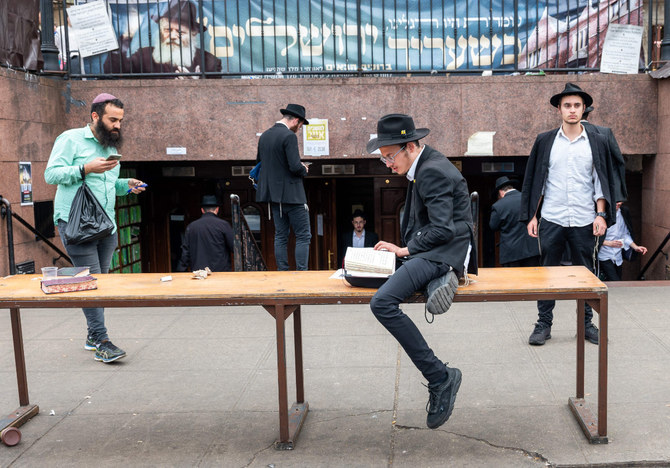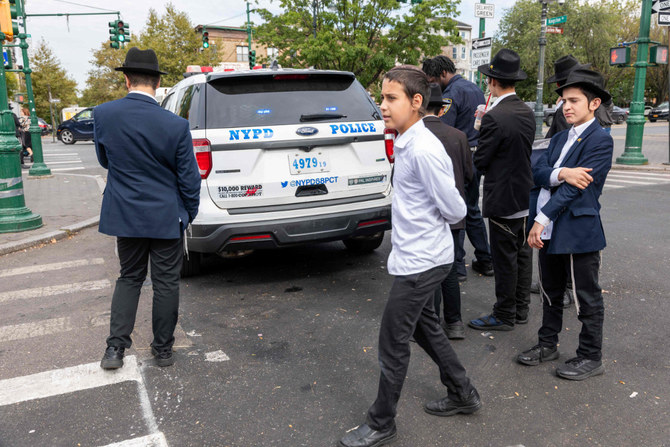NEW YORK: Jewish New Yorkers grieving after Hamas’ attack on Israeli civilians are split over the country’s response, with some voices urging Israel to defend itself and others increasingly warning of Palestinian “genocide.”
New York’s Jewish population is the largest outside Israel — 1.6 million people whose diverse political views regarding the US ally and the Palestinian cause have come to the fore since Hamas’ bloody assault and taking of hostages, and the deadly Israeli bombing campaign that followed.
As Palestinians in northern Gaza attempt to flee an expected Israeli ground invasion, aid agencies are warning of a growing humanitarian crisis in the blockaded enclave that Israel has cut off from electricity, water and fuel supplies.
Friday evening hundreds of New Yorkers gathered in Brooklyn in solidarity against Israel’s offensive — which has killed more than 2,200 Palestinians — wielding a banner emblazoned with the message “Jews Say Stop Genocide Against Palestinians.”
Protesters called on the United States Congress to demand a cease-fire and cut off the billions in funding for Israel.
The rally was sponsored by the left-wing organization Jewish Voice for Peace, and saw demonstrators march to the home of top US Senator Chuck Schumer.
Schumer, who is Jewish, was preparing to lead a delegation of senators to Israel as a show of support.
“There is only one way to end violence and that is to address the root causes of everything happening: 75 years of Israeli military occupation and apartheid, and end US complicity in this systemic oppression,” said Jay Saper of JVP.
‘Existential threat’
Some Jewish New Yorkers, meanwhile, have said the horror of the Hamas attacks, which left more than 1,300 Israelis dead, has bolstered their advocacy for Israel.
Philip Wolf, 25, told AFP that he didn’t grow up religious, but “having had family wiped out in the Holocaust, I know the critical importance of the continued flourishing Jewish state.”
“After the events of the last week, that connection feels even stronger.”
Prominent Jewish organizations including the American Jewish Committee and United Jewish Appeal backed pro-Israel demonstrations this week that drew crowds in the thousands, as well as staunch support from most local authorities, including New York state’s Governor Kathy Hochul and the city’s mayor, Eric Adams.
Two days after the Hamas attack, Arthur Schneier, the longtime senior rabbi at Manhattan’s Park East Synagogue, called the assault “the most existential threat to Israel since its founding in 1948,” a message that echoed Israeli authorities.
“As the American Jewish community,” he said, “we have a special responsibility.”
New York Rabbi Melissa Buyer-Witman said, “I am confident the Americans will again unite and support Israel whether they are Jewish or not,” speaking to AFP during a prayer service for the dead.
“Continue to keep Israel in your faith, in your thoughts,” she said at the event held at Temple Emanu-El, the first reform Jewish congregation in New York.
‘Crime of apartheid’
Public opinion in the United States, and in particular American Jewish opinion, “has always had much more sympathy for Israel than the Palestinians,” said Alex Kane, a senior writer at the progressive magazine Jewish Currents.
But the past decade has seen an uptick in criticism of Israel, he said, including over the country’s treatment of Palestinians and its government’s sharp moves to the right.
In 2021 a poll of Jewish voters by the Jewish Electorate Institute made waves when a quarter of respondents deemed that “Israel is an apartheid state.”
“That’s a remarkable number — that’s a lot of American Jews,” said Kane. “It’s not the majority, but it is a minority that believes that Israel is committing the crime of apartheid” — a conclusion human rights organizations including Amnesty International have also stated.
Over the past week US leaders including President Joe Biden and Secretary of State Antony Blinken have pledged unwavering support for Israel, publicly blessing the country’s reprisals that have included a relentless bombing campaign of Gaza and a call for 1.1 million people, approximately half of the enclave’s inhabitants, to immediately relocate south.
In accord with humanitarian responders and rights observers, organizations including Jewish Voice for Peace have denounced those actions — and the unequivocal backing from American leaders.
“We recognize that for many, the call to unconditionally support Israel, including sending increased military funding, is coming from a place of deep grief, fear and anxiety,” said Rabbi Alissa Wise, in a statement released by JVP.
“But we know that more weapons will only bring more harm to everyone.”
For Kane, it’s both possible and necessary to “say the attacks on Israeli civilians, and kidnapping of Israelis, is unconscionable — and collectively punishing Gaza is unconscionable.”
Through grief “we have to think critically,” he said, or risk fueling “hatred and very destructive, bloody actions that Israel is undertaking.”
“We have to be able to hold all these things at once.”































